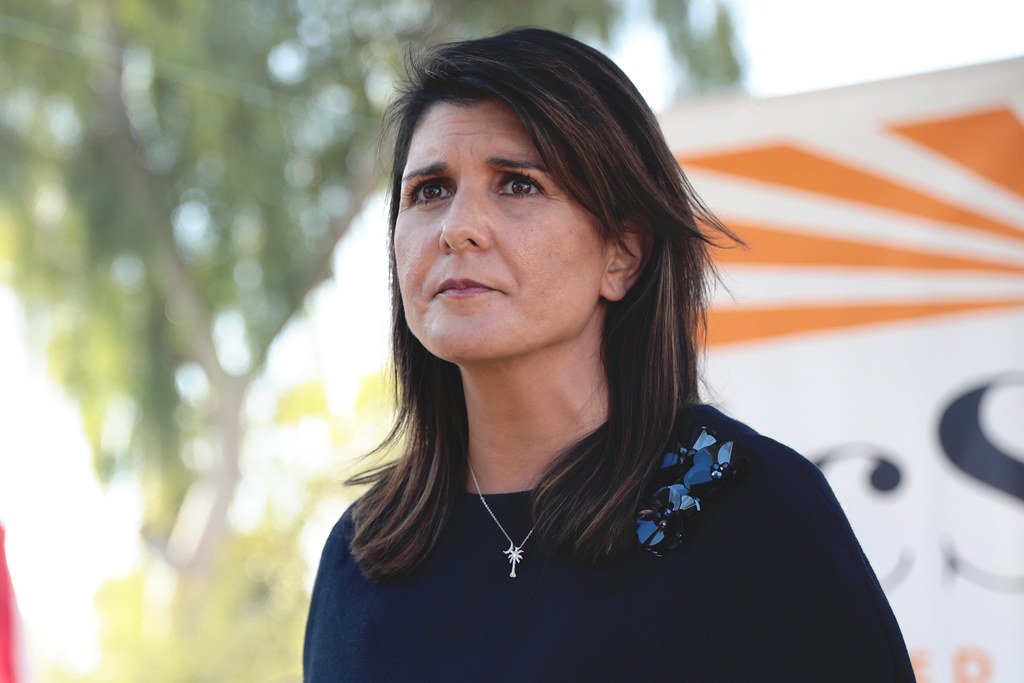

Nikki Haley is surging in New Hampshire with a little more than two months to go before the January 23, 2024 primary. Can she win the GOP nomination? It’s a long shot. But according to journalist Ron Brownstein she has a chance to catch Trump if:
- Chris Christie, Vivek Ramaswamy, and Ron DeSantis drop out of the race between now and the New Hampshire primary. In other words, the anti-Trump vote needs to consolidate behind her. This scenario is plausible only if these candidates’ supporters turn to Haley. It likely that Ramaswamy supporters will go to Trump. So might a good chunk of DeSantis voters. Again, it’s a long shot.
- Haley finishes third (behind Trump and DeSantis) in Iowa; 2nd (behind Trump) in New Hampshire; and 1st in her home state of South Carolina. If this happens, it could get interesting.
Here is Brownstein at CNN:
The reason some in the party now view Haley as a stronger option than DeSantis is not because of big shifts in the national polling, where he still typically leads her as a distant second place finisher to Trump; rather it’s because of how they are positioned in the first three major contests on the calendar – Iowa, New Hampshire and South Carolina.
DeSantis is following the same strategy relied upon by other recent GOP presidential hopefuls who ran hard to the right on social issues. Like Mike Huckabee in 2008, Rick Santorum in 2012, and Ted Cruz in 2016, DeSantis is betting his campaign predominantly on a strong showing in Iowa. Following the tracks of those predecessors, DeSantis has campaigned exhaustively in Iowa, devoted more effort to building a campaign organization there than anywhere else, and placed the highest priority on consolidating support among the state’s evangelical Christians. DeSantis has attracted the most backing from local elected officials (including Gov. Kim Reynolds, who endorsed him last week) and seems likely to win endorsements from the state’s leading religious conservatives.
Variations on that model allowed Huckabee, Santorum and Cruz to each win Iowa. But none of them came close to winning the nomination. Once each man was defined in Iowa as the candidate of evangelical social conservatives, he struggled to compete in states where those voters were not the dominant faction in the GOP electorate. Their problems immediately manifested in New Hampshire, when any momentum they acquired in Iowa crashed as if sliding into a snowbank: neither Huckabee, Santorum nor Cruz reached even 12% of the vote in the Granite State, where only about one-fourth of GOP voters identify as evangelicals (about half the level as in Iowa). Ultimately none of those past three Iowa winners captured more than a dozen states or came close to beating the front-runner in their primary races (John McCain in 2008, Mitt Romney in 2012 and Trump in 2016).
Haley’s campaign believes DeSantis has placed himself squarely on the same dead-end path. “Even if DeSantis were to do well in Iowa, which is a big ‘if’ given his current decline, he is in such a weak position in New Hampshire and South Carolina that it doesn’t matter,” Haley’s campaign argued in a memo released to reporters last week. “He has no end game.” In a sign of Haley’s improving position, her campaign this week announced it would launch a $10 million ad blitz in Iowa and New Hampshire, after spending only a little over $100,000 on its own advertising in those states so far. (A super PAC supporting Haley has made larger buys.) That dwarfs the ad purchases DeSantis’ campaign has announced, although he too has the help of a super PAC.
Many GOP strategists and operatives not affiliated with any of the campaigns agree that Haley now has more room than DeSantis to grow in New Hampshire and South Carolina. Recent polls in both states, including a CNN/SSRS survey in her home state of South Carolina, have found her with about one-fifth of the vote, roughly double DeSantis’ support.
Both Ayres and Rath say the New Hampshire electorate should be more favorable to Haley than to DeSantis. The weak showings for Huckabee, Santorum and Cruz continued a long-standing pattern in which New Hampshire GOP voters have rejected the most socially conservative candidates – even George W. Bush lost there in 2000.
Even if DeSantis finishes unexpectedly well in Iowa, “he will have done so by running to Trump’s right on abortion and gaining a significant portion of conservative evangelicals,” Dante Scala – a political scientist at the University of New Hampshire and author of “Stormy Weather,” a book on the New Hampshire primary – wrote in an email. “But that anti-abortion message does not play well here.” By contrast, Scala said, Haley’s message of seeking “consensus” on abortion “will pay off among NH GOP women (and college educated GOPers generally).” Haley has said that although she is personally “pro-life,” she does not believe there are enough votes in Congress to pass a national abortion ban. “At the federal level, it’s not realistic,” she has argued on multiple occasions.
Read the entire piece here.